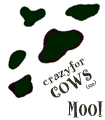|
|
|
|
|
|
Grass Grazed Milk - The Benefits
By Helen Gadd
There's been a lot in the media recently about the dubious effect of the livestock
industry on both the animals themselves and the planet.
Cattle raised on American-style factory farms (rare in the UK but still making its presence felt)
often live a short and miserable life, and damage the environment to boot. As if this weren't enough,
the meat and milk from these cattle aren't nearly as healthy for human consumers as the meat and
milk from free-roaming grass-fed cattle. Here are a few good reasons to buy local milk
from ethically reared cows, and help to keep Britain's cattle out in the meadows rather than crammed into pens.
It's Good for Your Bones
Everybody knows that milk contains calcium, and calcium is great for your bones. While there's no evidence that
grass-fed milk actually contains more calcium than factory-produced milk, grass-fed milk is far richer in
Vitamin D than its less ethical counterparts. Vitamin D is essential for the uptake of calcium into the body,
and provides a whole host of other benefits along the way - including improved moods and better immune system
functioning. Consuming grass-fed dairy products will therefore result in a greater amount of calcium being
processed by your system, as well as making you generally a lot healthier and happier! Vitamin D deficiency
is a growing problem in the Western world, despite the fact that Vitamin D is relatively easy to come by (
it's absorbed through the skin via sunlight - one reason why milk produced from cows feeding on
chlorophyll-rich grass which itself feeds off sunlight has higher levels of Vitamin D). You can buck this
trend by making sure that your dairy products are from happy, grass fed cattle!
It's Better for Your Heart
Milk and dairy products are a reasonably good source of Omega 3 Fatty Acids. Omega 3s are superheroes of the health world,
responsible for an enormous variety of benefits. The human body can't make its own Omega 3s, so hungrily absorbs any it
can get its hands on and redistributes them to fulfil a huge range of tasks around the body. One of the ways in which
Omega 3s are helpful to the body is in the protection of the heart. Omega 3 fatty acids have on numerous occasions
demonstrated their efficacy at improving the circulation and quality of the blood. They help blood to clot properly,
make artery walls much healthier, help to regulate the rhythm of the heart, and lower blood pressure. All of this greatly
lowers one's risk of developing heart disease. It's been found
that the concentration of these heart-saving Omega 3s is vastly superior in milk from grass-fed cattle, meaning that
milk from happy, meadow-grazing cows has a lot more nutritional benefit than milk from their grain-fed,
factory-farmed counterparts.
It's Good for Your Brain
The same Omega 3 fatty acids mentioned above are also fantastic for your brain. There's a reason why an old wives' tale has
it that eating fish will make you clever - fish oils are crammed full of Omega 3 fatty acids, and Omega 3 fatty acids
have been proven to improve brain function. It's been found that consumption of Omega 3s can actually increase your brain
volume, and even keep the effects of neurological ageing at bay. Not only this, but they can provide potent protection
against a number of mental health conditions and attention deficit disorders.
Studies on Durham schoolchildren
found that giving Omega 3 supplements to those with ADHD and similar conditions vastly improved their attention span, and
even appeared to boost their intelligence. So pouring some grass-fed milk over your children's corn flakes in the morning
could pay off when their report card comes in!
It's Better for the Environment
It's hard to argue that raising cattle is good when it comes to greenhouse emissions - but in fact, raising grass-fed
cattle can be very beneficial to the environment in other ways. Cattle grasslands not only protect vast tracts of
important habitat from human development, but cattle are also very effective at
locking carbon back into the soil.
An awful lot of the dangerous carbon in our atmosphere is released from the soil. Cattle, however, with their ability to
churn the soil, trim the grass, and thus encourage germination, are ensuring that carbon-locking grass continues to grow
in a speedy cycle, ensuring that more harmful carbon is effectively sealed into the earth rather than damaging the
atmosphere. Of course, this only applies to cattle who are allowed to roam the meadows and chomp on the grass, so choose
grass-fed if you want to save the planet, keep cattle happy, and improve your health at the same time!
|
|



